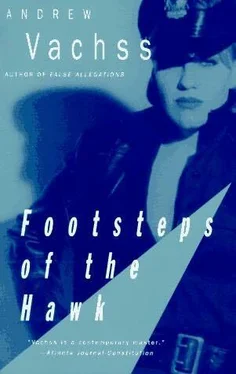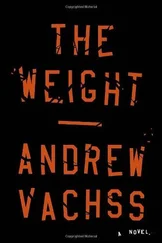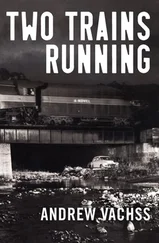The language of the reports was as cold as the corpses. They all ended the same way.
MANNER OF DEATH: HOMICIDE.
"Check where I marked," Hauser said.
Portions of the reports were covered with a yellow highlighter. But I didn't need it to pick out the red ribbon Belinda told me about— the woman on University Place had one stuffed inside her, just a little piece trailing out. But the two later ones— after Piersall was locked up— there was no ribbon mentioned. What the hell…?
"So this one woman, the one in New York, that's the only place they found the red ribbon?" I asked. "What about the one in Jersey— the one who survived?"
"They didn't need any red ribbon there, Burke. I did a NEXIS spin too. This cop pal of yours, he didn't happen to mention DNA, did he?"
"No," I said, already getting it, wondering if I could possibly be as stupid as Belinda must be thinking I was.
"The investigation they did— the one in Jersey, not here— they introduced DNA–fingerprinting evidence on top of the ID. The woman had enough of Piersall's flesh under her fingernails to make it open–and–shut. No question about it— they got the right guy"
"You're…sure?"
"A dead match," Hauser told me.
"So why wouldn't the ME report on the red ribbon in the other killings?"
"You got me, Hauser said. "It's the same coroner's office, true enough, but they used a different doctor for each one. I don't see anything suspicious in that— whoever's around, that's who gets to do it. And I read it close ,too— no red ribbon, no trace of red fibers, no nothing."
"So there's no way this guy is innocent?"
"Not of the Jersey crime," he confirmed. "That DNA stuff is dynamite. I've been reading up on it. Even checked with an expert. There's some people in the forensics field who claim it can get screwed up pretty easy— wrong samples, not enough differentiation fields to work with, poor tagging procedures…all that. But the bottom line is that it's still being used— you got people being convicted with it every day— people getting out of jail with it too. They use it for paternity tests too–when the regular blood test isn't conclusive enough for the court."
"So you're off the job?" I asked him.
"Not a chance," he replied. " Something's going on here. Maybe not what you— or that cop friend of yours— think. But something. Let me know what happens, okay?"
"Yeah."
I called in to Mama's. "Same girl," she said, as soon as she recognized my voice. "No wig this time."
"It's starting to get messy," I told her. "Any other calls?"
"Lawyer call. Say his name: For–too–not–toe. He say, he have your material. Six o'clock tonight."
"Thanks, Mama. Nothing from the Prof?"
"No. Maybe busy with fighter?"
"Maybe. I'll call you later."
I ran through it in my head, showering and shaving on automatic pilot. Copycat crime, it's a fact of life. But most of the time, they copy the style more than the deed. There's no such thing as a first–time crime— humans have been on the planet too long for that. But once the media names a crime— like when the newspaper jerks started calling gang rape "wilding"— it becomes the hot ticket and every punk wants to play.
Take carjacking— nothing new about it except the name. But once the name catches on, the crime catches fire. It's all grapevine stuff: no way there's a nationwide group of mutants united in a giant conspiracy to hijack cars. It's a moron–move all the way— you risk life in the pen for a used car. But as soon as the media names it, the twenty–four–karat dumb–fuck imbeciles have to go and do it. Starts in D.C., spreads to New York. Then over to L.A., back to Chicago, down to Miami. You ask one of those idiots why they do it, they couldn't tell you. A whole battalion of sheep, following the herd, armed and stupid.
The latest craze is so totally retarded I almost couldn't believe it when I first heard about it— now they're robbing toll booths on the bridges. The G.W., the Triborough, the Whitestone…you name it. They just drive up to the booth, stick a gun out the window, and demand the cash. Incredible. Start with armed robbery, throw in a string of other crimes, and you're risking a dozen years Upstate before you can even dream about the Parole Board. All for what? A few handfuls of change and a bunch of tokens you'd have to sell at a discount. That's why prison never changes anybody— you can convince a man to be honest, but there's no way to make him smart.
Of course, the people who collect the tolls, they're demanding the right to carry firearms. There's a pretty picture— some self–righteous loon who watched too many cop shows blazing away in the middle of rush hour.
The real answer would be to eliminate the toll collectors entirely. They could train chimps to do it, but the chimps would probably get bored and swing off the job.
You see it everywhere. Somebody says they found a syringe in their can of Pepsi, next thing you know, tampered cans are showing up all over the country. Sure. Good thing they don't make you pass an IQ test before they accept you into prison— most of the joints would be empty.
A pattern crime, one with a signature , that's custom–made for copycats. That's a fact of life in this cancer ward of a city. But who could be copying something he never heard of…?
I finished shaving, still no closer to an answer. Time to go to work. I know how to look like a lawyer. All you need is a dark pinstripe suit, a dress shirt with a monogram on the cuff, any necktie that looks expensive. The younger breed goes more for the Italian look, more silk, more slouchy— the older guys stay closer to tradition. They wear their hair different too. The older guys go for blow–dried razor–cuts— the younger ones wear their hair longer, go heavy on the gel. They both display flashy wristwatches and leather attaché cases— slim ones, so they don't get confused with the 18–B guys, who have to haul files around with them. And the look is indispensable: superior, snotty, arrogant, with a distinctive weasel–tint to the eyes.
I didn't bother with any of that to go see Fortunato. He knows what I do. And I know what he is. I put on a pair of carpenter's pants over steel–toed work shoes. Then a black sweatshirt under an old leather jacket. Lots of pockets, lots of room…I didn't need an attaché case.
Fortunato makes most of his scores downtown, from the pits on the first floor of Centre Street to the tower in Foley Square, but he wasn't a Baxter Street type of guy— his office was on Forty–second, between Madison and Lex.
His name was in large gilt letters, standing guard over the double doors to the office. I stepped inside, into an empty reception area. The sliding glass window to the receptionist's desk was standing open. I reached my hand in and rapped on the top of the desk. A guy in his twenties came around a corner. He was wearing a white shirt with the sleeves rolled up. His tie was pulled loose from around his neck. He looked pressured.
"Can I help you?" he asked, an undercurrent of annoyance in his voice.
"I'm here to see Fortunato," I told him. "Name's Burke."
He turned his back on me, walked away. He was back in a minute, said "Come in," and hit a buzzer to release the inner door.
"Last one on the left," he told me.
Fortunato's office was bigger than the whole reception area, a corner spot with two exposures through large windows. He was sitting behind his desk, a kidney–shaped monster— its left lobe held three separate telephone mini–consoles— the right had a smoked–plastic stack of trays loaded with various documents. The broad expanse in the middle was empty, gleaming like it had just been polished. I walked in, took the middle of three identical leather chairs facing the desk.
Читать дальше












